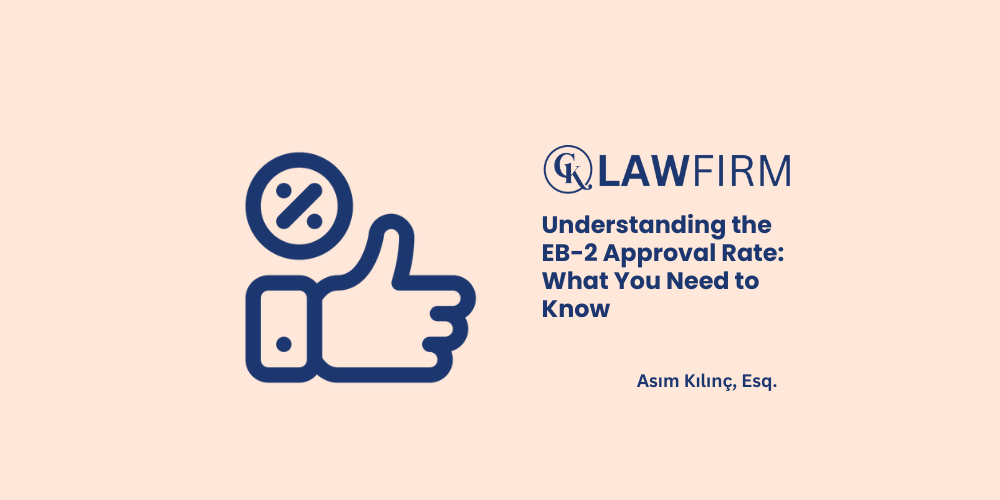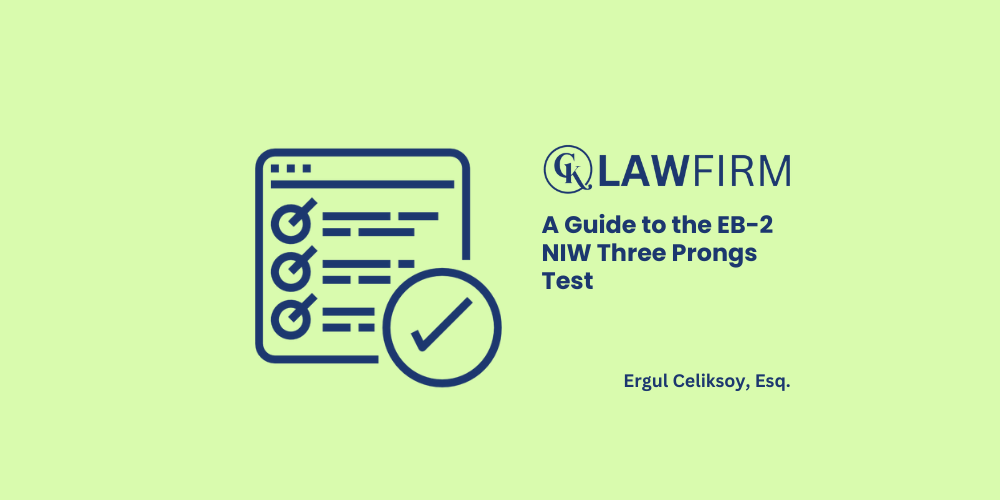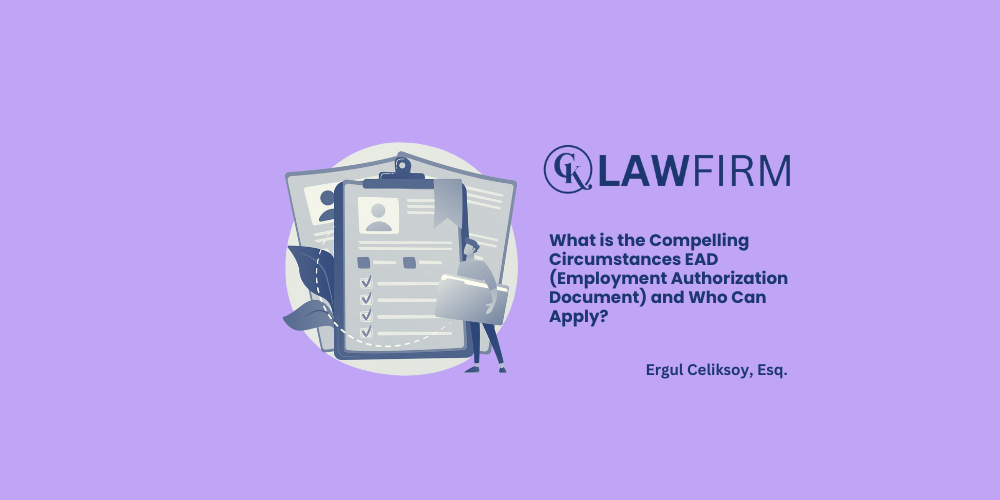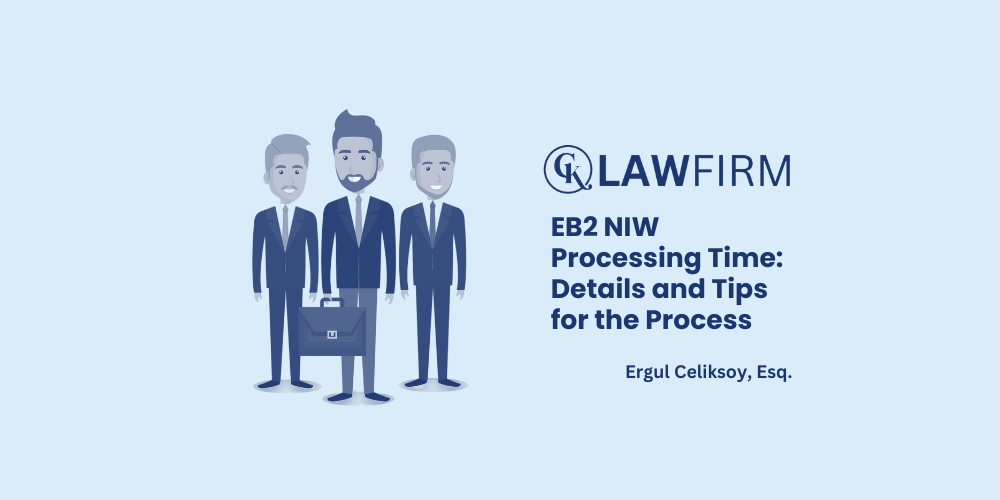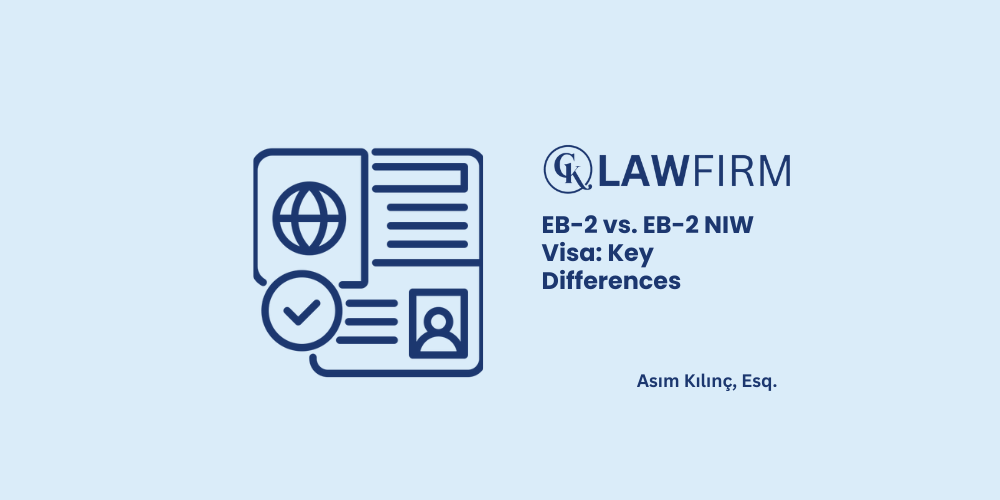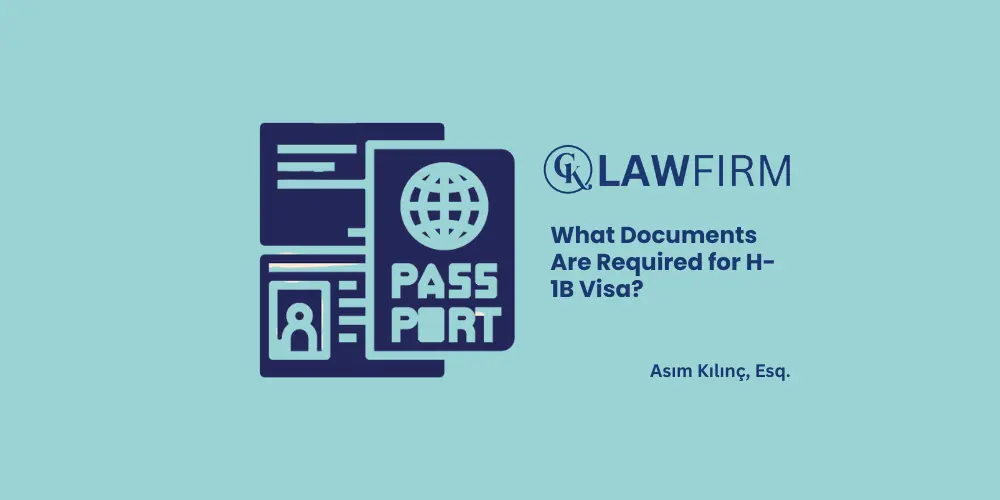Schedule an Appointment with Our Attorneys Now
Asım Kılınç, Immigration Attorney, CK Law Firm
The EB-2 visa is one of the most popular immigration pathways for highly skilled professionals, those with advanced degrees, and individuals demonstrating exceptional abilities in fields like science, business, or the arts. However, despite its appeal, the approval process for EB-2 petitions, particularly those with a National Interest Waiver (NIW), can be complex and subject to significant scrutiny. In this blog, we’ll explore what influences EB-2 approval rates, the challenges applicants face, and how to maximize your chances of success.
Below are the key topics we will cover:
- What is EB-2 and Who Qualifies?
- Key Factors Influencing EB-2 Approval Rates
- Trends in EB-2 Approval Rates
- What Can You Do to Improve Your Chances?
If you have any additional questions or concerns outside the scope of these topics, feel free to reach out via our website. For more personalized inquiries, don’t hesitate to connect with me on LinkedIn. Enjoy reading!

What is EB-2 and Who Qualifies?
The EB-2 visa is an employment-based green card category for foreign nationals who:
- Have an advanced degree (beyond a baccalaureate degree), or
- Possess exceptional ability in their field (e.g., sciences, arts, business).
One of the advantages of the EB-2 category is its relatively faster processing time compared to other employment-based green cards, such as EB-3. However, the application process is competitive and requires applicants to meet specific eligibility standards. For those applying under the National Interest Waiver (NIW), applicants do not need a job offer, but they must prove that their work is of significant benefit to the United States.
Key Factors Influencing EB-2 Approval Rates
- Strong Evidence of Qualifications: One of the key factors in determining your EB-2 approval rate is the strength of your qualifications. For standard EB-2 applicants, you need to provide proof of your advanced degree or exceptional ability in your field. If you are applying under the EB-2 NIW, you must present evidence that your work is of national importance and will benefit the U.S. in a significant way.
- Complete and Well-Documented Application: An incomplete or poorly documented application can lower your chances of approval. It’s crucial to provide all required documentation, including academic records, letters of recommendation, proof of exceptional ability, and any other relevant supporting materials.
- Strong Legal Representation: Hiring experienced immigration attorneys who understand the intricacies of the EB-2 process can improve your approval odds. Skilled lawyers can help prepare a compelling case, address potential challenges, and guide you through the complex application process.
- Petition Type (EB-2 vs. EB-2 NIW): While both visa types are part of the EB-2 category, the approval rates for the EB-2 NIW can differ due to the nature of the petition. The EB-2 standard visa requires a job offer and labor certification, while the EB-2 NIW offers flexibility but comes with a higher burden of proof to demonstrate national interest.
Trends in EB-2 Approval Rates
Approval rates for EB-2 petitions, particularly those under the NIW subcategory, have been subject to shifts due to increasing competition and changes in how USCIS evaluates applications. Historically, the EB-2 has had a relatively higher approval rate compared to other visa categories. However, recent data indicates that the approval rate for both regular EB-2 and NIW petitions has declined slightly in recent years.
In FY 2024, the USCIS has focused on more stringent review processes, leading to higher rejection rates for cases with weak evidence or unclear arguments about national interest. This trend underlines the need for applicants to submit robust and well-documented petitions that fully meet the visa criteria.

What Can You Do to Improve Your Chances?
If you’re applying for an EB-2 visa, here are a few steps you can take to improve your chances of success:
1. Thoroughly Document Your Case
The foundation of a successful EB-2 application is comprehensive and well-organized documentation. Whether applying under the advanced degree or exceptional ability category, you need to present clear and convincing evidence of your qualifications. If you are applying under the NIW, ensure you can articulate exactly how your work benefits the U.S. national interest.
2. Seek Professional Guidance
Given the complexities of the EB-2 process, working with an immigration attorney or professional who specializes in employment-based visas is highly recommended. An experienced attorney can help you navigate the application process, ensuring that all documentation is in order and presenting your case in the best possible light.
3. Prepare a Strong National Interest Case
For NIW applicants, your case for national interest must be solid. Be prepared to demonstrate how your work will positively impact U.S. interests, such as improving healthcare, advancing scientific research, or contributing to the national economy. Strong letters of recommendation from respected experts in your field can also strengthen your case.
4. Stay Updated on USCIS Trends
USCIS approval rates can change year by year, and staying informed about trends in immigration policy and processing times is key. By being aware of current statistics and adjusting your petition accordingly, you can better align your application with USCIS expectations.
The EB-2 visa remains a vital immigration path for highly skilled professionals, but approval rates can fluctuate due to stricter scrutiny by USCIS. To maximize your chances of success, it is essential to submit a well-documented petition, particularly if applying under the National Interest Waiver. By understanding the factors that influence EB-2 approval rates and preparing a strong case, you can significantly improve your chances of obtaining a U.S. green card.
For additional support or personalized assistance, feel free to reach out via the CK Law Firm official website, or connect with me on LinkedIn for more personalized guidance.
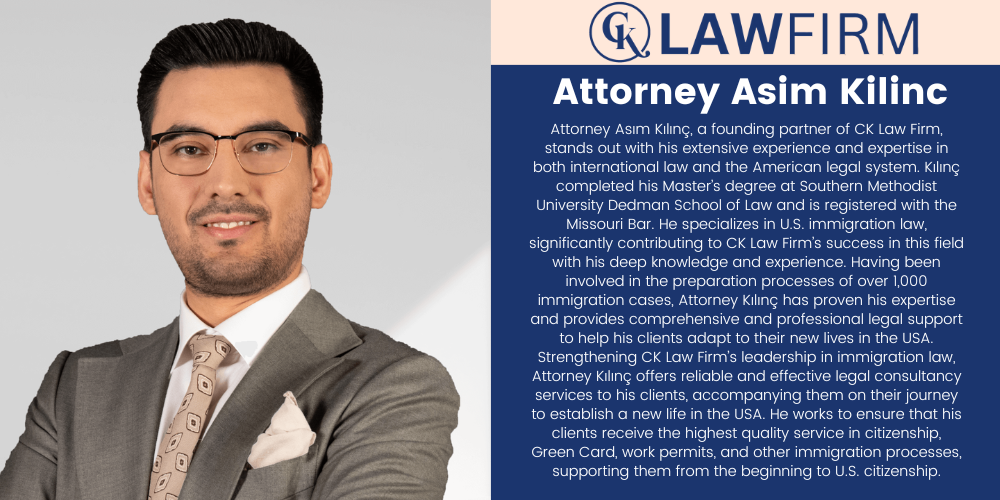
By Ergul Celiksoy, Immigration Attorney at CK Law Firm
The EB-2 National Interest Waiver (NIW) is a significant opportunity for individuals with advanced degrees or exceptional abilities to obtain permanent residency in the United States. Unlike other employment-based visas, the NIW allows applicants to bypass the labor certification process if they can demonstrate that their work is in the national interest. Central to this process is the “Three-Prong Test” established by the 2016 Matter of Dhanasar decision. Here are the topics I will cover in our blog:
- What is the EB-2 National Interest Waiver (NIW)?
- Understanding the Three-Prong Test
- Key Strategies for a Successful EB-2 NIW Petition
- Why the Three-Prong Test Matters
While answering these questions, I will also cover the related sub-headings of interest. However, as with any visa application, you can visit the official website of CK Law Firm for professional support with your E2 visa application. Additionally, feel free to connect with me anytime via my LinkedIn account.
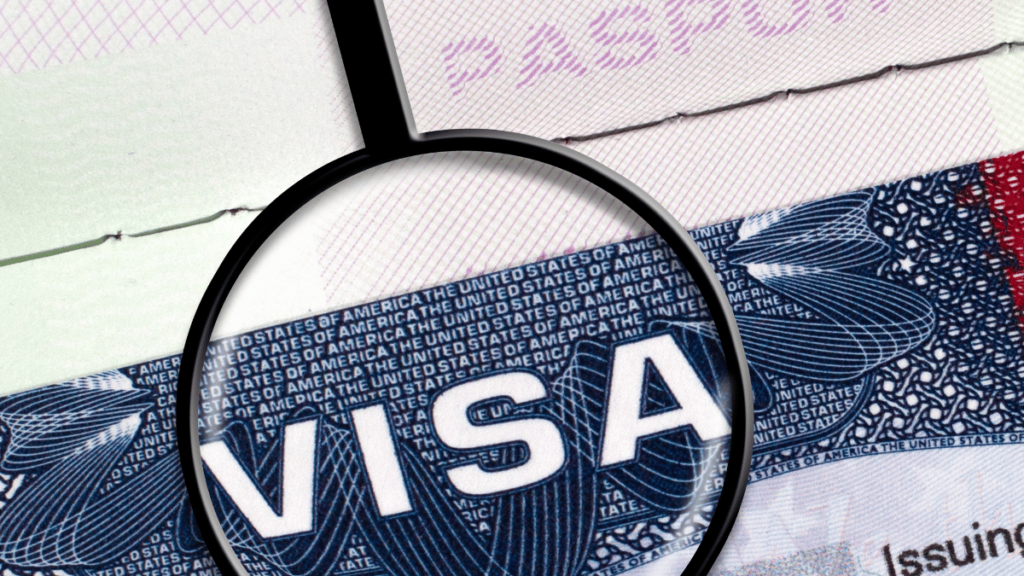
What is the EB-2 National Interest Waiver (NIW)?
The EB-2 NIW is part of the employment-based second preference (EB-2) visa category. It provides a pathway for individuals to self-petition for a green card without needing a specific job offer or employer sponsorship. The key requirement is proving that waiving the job offer and labor certification is in the best interest of the United States.
To qualify, applicants must pass the EB-2 NIW Three Prongs Test, which assesses the merit and national importance of their proposed work.
Understanding the Three-Prong Test
The EB-2 NIW Three Prongs Test is the core evaluation framework used by the United States Citizenship and Immigration Services (USCIS) to assess EB-2 NIW petitions. Introduced in the Matter of Dhanasar case in 2016, this test outlines three critical criteria that applicants must meet to qualify for a National Interest Waiver. Each prong is designed to determine whether the applicant’s work is valuable enough to bypass the standard labor certification process. Let’s break down each prong in detail.
1. Substantial Merit and National Importance
Applicants must show that their proposed endeavor has significant value and benefits the United States. This can apply to a wide range of fields, including:
- Science and technology
- Business and entrepreneurship
- Health and medicine
- Culture and education
The endeavor should go beyond local or regional impacts and demonstrate a broader national benefit.
Example: A researcher working on renewable energy technologies that reduce carbon emissions and enhance energy independence.
2. Well-Positioned to Advance the Proposed Endeavor
The applicant must prove they have the skills, experience, and resources to advance their proposed work successfully. Evidence for this prong may include:
- Educational qualifications
- Professional achievements
- Relevant work experience
- Letters of recommendation
- A detailed plan outlining how the work will be carried out
Example: An entrepreneur with a track record of successful startups proposing to develop a new cybersecurity platform addressing national security concerns.
3. The Benefit of Waiving the Job Offer and Labor Certification
The final prong requires demonstrating that it would be in the United States’ best interest to waive the usual job offer and labor certification requirements. This could apply if the applicant’s work is so valuable or urgent that the traditional hiring process would hinder its progress.
Example: A public health expert developing innovative solutions to combat infectious diseases, where the immediacy and importance of the work make a job offer impractical.

Key Strategies for a Successful EB-2 NIW Petition
- Provide Comprehensive Evidence: Support each prong with strong documentation, including publications, awards, and expert letters.
- Highlight National Impact: Emphasize how the endeavor benefits the country as a whole.
- Demonstrate Unique Qualifications: Showcase the applicant’s distinctive skills and their ability to drive meaningful progress.
Why the Three-Prong Test Matters
Successfully meeting the Three-Prong Test criteria allows applicants to bypass the labor certification process, reducing delays and providing more autonomy in shaping their professional path. By carefully preparing evidence and articulating the national importance of their work, applicants can strengthen their case for an EB-2 NIW approval.
If you are considering applying for an EB-2 NIW, understanding the Three-Prong Test is crucial. With thorough preparation and clear documentation, you can make a compelling case for why your work serves the national interest and deserves a waiver of traditional employment-based requirements.
If you want to navigate the complexities of the EB-2 NIW process smoothly and increase your chances of approval, feel free to contact us via the official website of CK Law Firm. You can also reach out to me directly on my LinkedIn account for personalized assistance and further guidance.
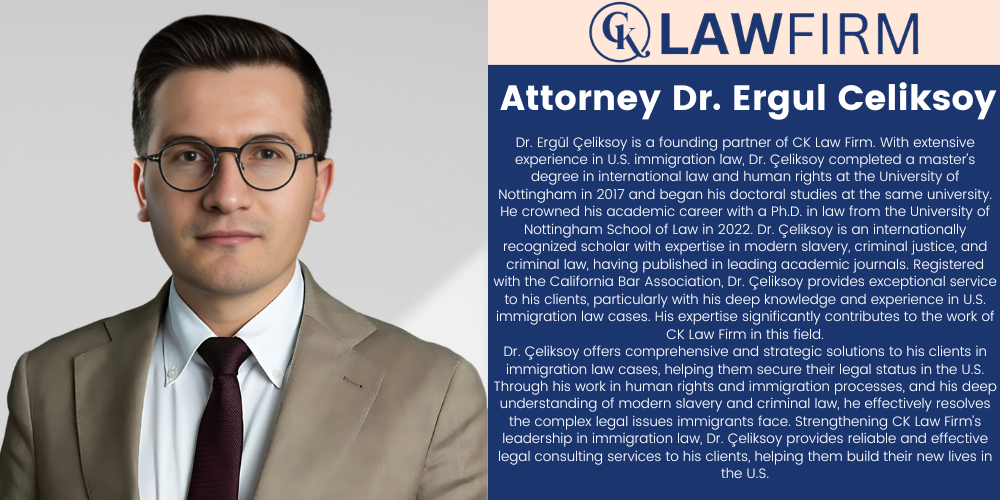
By Ergul Celiksoy, Immigration Attorney at CK Law Firm
In the U.S., individuals dependent on a specific visa type may face risks of job loss due to employer changes, economic hardships, or other reasons. To address such challenges, the Compelling Circumstances Employment Authorization Document (EAD) provides a legal work authorization solution. This document is particularly designed for individuals in the Green Card process but awaiting a final decision. In this article, we’ll address the following key questions:
- What is the Purpose of the Compelling Circumstances EAD?
- How Does the Application Process Work?
- Who is Eligible to Apply?
- What Are the Benefits of the Compelling Circumstances EAD?
If you have additional questions, feel free to reach out via the comments section below this article, through LinkedIn, or directly via the CK Law Firm website!
What is the Purpose of the Compelling Circumstances EAD?
The Compelling Circumstances EAD aims to assist individuals tied to a specific employer through their visa status in overcoming financial and personal hardships in case of job loss. The U.S. Citizenship and Immigration Services (USCIS) evaluates applications based on the following criteria:
- Economic Impact: The financial consequences of unemployment on the applicant and their family.
- Social Impact: Potential negative effects on U.S. employers, clients, or the community due to the lack of work authorization.
- Immigration Compliance: The applicant’s adherence to past immigration and work authorization requirements.
This authorization is particularly crucial for individuals whose Green Card petitions (I-140) have been approved but are waiting for a visa number. It also provides a temporary solution for those holding employer-sponsored visas such as H-1B or L-1, who are at risk of losing their jobs.
How Does the Application Process Work?
Applying for a Compelling Circumstances EAD involves specific steps:
- Completing Form I-765: This is the primary form required by USCIS for work authorization.
- Providing Supporting Evidence: Documents proving compelling circumstances (e.g., job loss, health issues, financial hardships).
- Submitting Immigration Status Documentation: Approval notice of I-140, proof of current visa status, and any relevant employment agreements.
Once the application is submitted, USCIS conducts a thorough review of the applicant’s circumstances. Each application is evaluated on its merits, taking into account the unique details of the applicant’s case.
Who is Eligible to Apply?
The Compelling Circumstances EAD is available to individuals meeting specific criteria:
- Green Card Applicants: Those with approved I-140 forms but waiting for visa availability.
- H-1B or L-1 Visa Holders: Individuals who have separated from their employers and are seeking new job opportunities.
- Non-Immigrant Visa Holders: Individuals whose current visas are nearing expiration but can demonstrate compelling circumstances.
Approval rates depend on the strength of supporting evidence and the severity of the circumstances. USCIS also considers the applicant’s prior compliance with immigration laws.
What Are the Benefits of the Compelling Circumstances EAD?
- Temporary Solution: Provides work authorization while waiting for a visa number.
- Flexibility: Eliminates dependency on a single employer and opens new job opportunities.
- Support for the Immigration Process: Ensures uninterrupted progress in the Green Card application process.
Conclusion
Applying for a Compelling Circumstances EAD can be a complex process. Since each case is unique, working with an immigration attorney can significantly increase the chances of a successful application. For professional assistance, detailed information, or consultation services, feel free to contact us at cklawfirm.org, info@cklawfirm.org, or via LinkedIn.
Who is Attorney Ergül Çeliksoy?
Attorney Dr. Ergül Çeliksoy is a founding partner of CK Law Firm and also serves as an Assistant Professor of Law at the University of Nottingham. With extensive experience in U.S. immigration law, Dr. Çeliksoy completed a Master’s degree in international law and human rights law at the University of Nottingham in 2017, followed by a Ph.D. at the same university. His Ph.D., completed in 2022 at the University of Nottingham School of Law, marked a significant milestone in his academic career. Dr. Çeliksoy has published extensively in leading academic journals and is internationally recognized for his expertise in modern slavery, criminal justice, and criminal law. As a member of the California Bar, Dr. Çeliksoy offers exceptional service to his clients, particularly in U.S. immigration law cases. His expertise and experience in immigration law significantly contribute to CK Law Firm’s work in this area.
Dr. Çeliksoy provides comprehensive and strategic solutions to his clients in immigration law cases, helping secure their legal status in the U.S. His work on human rights and immigration processes, particularly in modern slavery and criminal law, effectively addresses the complex legal issues immigrants face. Dr. Çeliksoy reinforces CK Law Firm’s leadership in immigration law by offering reliable and effective legal consulting services to his clients, helping them build new lives in the United States.
By Ergul Celiksoy, Immigration Attorney at CK Law Firm
The EB2 NIW application process can be quite complex, and processing times can vary depending on various factors. In this article, I will answer some of the most frequently asked questions about the processing time of the EB2 National Interest Waiver visa based on my experience working on hundreds of cases. By reading this article, you will find answers to the following questions:
- What is EB2 NIW, and who is eligible?
- Advantages of the EB2 NIW Visa
- EB2 NIW Process and Timeline
- Factors Affecting EB2 NIW Processing Time
- Important Considerations in the EB2 NIW Application Process
If you have questions about the EB1 NIW visa type or any other immigration matters, please feel free to reach out to me through the comments section below this article, by messaging me directly on LinkedIn, or via the CK Law Firm Immigration Law Firm’s website, which I co-founded.
What is EB2 NIW, and Who is Eligible?
The EB2 NIW is a visa category designed for qualified individuals who wish to work and live in the United States. The National Interest Waiver (NIW) allows applicants whose work serves the national interest of the United States to apply for immigration without requiring employer sponsorship. This visa category is generally suitable for highly educated professionals, experts in their fields, researchers, academics, and other qualified individuals.
Advantages of the EB2 NIW Visa
The EB2 NIW visa offers several advantages that make it more appealing compared to other immigration pathways. Not needing employer sponsorship, the ability to apply without a job offer, and the opportunity to obtain permanent residency in the United States are among the key benefits of this visa. Additionally, the EB2 NIW visa allows the applicant’s family members to obtain Green Cards as well.
EB2 NIW Process and Timeline
The EB2 NIW application process generally consists of two main stages: the I-140 petition and the subsequent I-485 form submission for the Green Card application. These two stages have different processing times and vary based on specific conditions and the workload of the United States Citizenship and Immigration Services (USCIS).
I-140 Petition: The First Step of the Application
The I-140 petition is the initial application submitted to USCIS to determine your eligibility for the EB2 NIW visa. This petition includes detailed documentation proving that the applicant possesses qualifications that serve the national interest of the United States. USCIS reviews this application and then makes a decision to approve or deny it.
I-140 Processing Time:
The processing time for the I-140 petition usually ranges from 8 to 14 months. However, this timeframe can be extended based on USCIS’s current workload, the complexity of the application file, and the completeness of the submitted documents. In some cases, applicants may be required to submit additional evidence (Request for Evidence – RFE), which can further delay the process.
I-485 Form: Green Card Application
After the I-140 petition is approved, the applicant can proceed to complete the I-485 form for the Green Card application. The I-485 form assesses whether the applicant is eligible to reside legally in the United States. During this stage, USCIS examines the applicant’s health, security background, biometric data, and other personal information.
I-485 Processing Time:
The processing time for the I-485 form generally ranges from 10 to 20 months. However, this period may be extended depending on additional steps such as biometric appointments, interview dates, and security screenings. The interview process, in particular, can take longer depending on the workload of specific USCIS offices.
Premium Processing: Is it Possible to Shorten the Processing Time?
EB2 NIW applications are generally not eligible for Premium Processing. Premium Processing allows applications to be processed within 15 days; however, since this service is not available for EB2 NIW applications, applicants must adhere to standard processing times. Therefore, careful and meticulous preparation at every stage of the application process is crucial.
Factors Affecting EB2 NIW Processing Time
Several factors can affect the processing time of an EB2 NIW application. While some of these factors may be beyond the applicant’s control, others can be managed through careful preparation.
- USCIS Workload and Regional Differences:
The workload of USCIS offices can directly impact the processing time of applications. Some offices in certain regions may be busier than others, leading to differences in processing times. - Completeness and Accuracy of the Application File:
Submitting complete and accurate documents during the application process can speed up the processing time. Incomplete or incorrect documents may lead to USCIS requesting additional evidence, which can delay the process. - Requests for Additional Evidence (RFE):
USCIS may request additional evidence while reviewing the application file. RFEs can cause delays in the application process as preparing and submitting the requested documents requires additional time. - Interview Process:
Applicants may be called for an interview during the I-485 form process. The date of the interview and the workload of the USCIS office where the interview will take place are other important factors affecting processing time.
Important Considerations in the EB2 NIW Application Process
There are some important points to consider during the EB2 NIW application process. These points can help ensure that the application process proceeds smoothly and quickly.
- Accurate and Complete Preparation of Documents:
Ensure that all application documents are accurate, complete, and error-free. Missing or incorrect documents can lead to delays in the process. - Timely Updates and Follow-Up:
It is important to act quickly in response to any notifications or requests for additional documents from USCIS. Regularly check the status of your application on the USCIS website. - Stay Updated on Immigration Law Changes:
Immigration laws and USCIS policies may change from time to time. Therefore, it is important to stay updated on current legal regulations and guidelines published by USCIS to avoid any unpleasant surprises during the application process.
Conclusion
The EB2 NIW visa offers an ideal option for qualified professionals and highly educated individuals seeking to obtain permanent residency in the United States. However, the application process for this visa can be complex and lengthy. Processing times can vary depending on the complexity of the applicant’s file, USCIS’s workload, and other factors. Careful and meticulous preparation during the application process can help the process proceed more quickly and smoothly.
If you wish, you can contact me via cklawfirm.org, by email at info@cklawfirm.org, or directly on LinkedIn to find out if you are eligible for the EB-1A visa through our free consultation service. All you need to do is send us your CV. We will review your CV and get back to you within 24 hours.
Who is Attorney Ergül Çeliksoy?
Attorney Dr. Ergül Çeliksoy is the co-founder of CK Law Firm and also serves as an Assistant Professor of Law at the University of Nottingham. With extensive experience in U.S. immigration law, Dr. Çeliksoy completed his master’s degree in international law and human rights at the University of Nottingham in 2017 before beginning his Ph.D. studies at the same university. Dr. Çeliksoy earned his Ph.D. in law at the University of Nottingham School of Law in 2022, marking a significant milestone in his academic career. He is a recognized academician with expertise in modern slavery, criminal justice, and criminal law, with publications in leading academic journals.
As a member of the California Bar, Dr. Çeliksoy provides outstanding service to his clients, particularly in U.S. immigration law cases. His knowledge and experience in immigration law are valuable assets to CK Law Firm’s practice in this field. Dr. Çeliksoy offers comprehensive and strategic solutions to his clients in immigration law cases, helping them secure their legal status in the U.S. His deep understanding of human rights and immigration processes, along with his expertise in modern slavery and criminal law, enables him to effectively address the complex legal issues faced by immigrants. By offering reliable and effective legal counseling services, Dr. Çeliksoy helps his clients build new lives in the U.S.
Asım Kılınç, Immigration Attorney, CK Law Firm
Navigating the U.S. immigration process can be complex especially when deciding between the EB-2 vs. EB-2 NIW visa. Both visas fall under the employment-based second preference category but they differ significantly in eligibility, application process, and benefits. This guide will break down the essential differences to help you determine which visa is right for you.
Below are the key topics we will cover:
- What Is the EB-2 Visa?
- Key Differences Between EB-2 and EB-2 NIW Visas
- Who Qualifies for an EB-2 Visa?
- Who Is Eligible for the EB-2 NIW Visa?
- Advantages and Disadvantages of EB-2 and EB-2 NIW Visas
- Which Visa Is Right for You: EB-2 or EB-2 NIW?
If you have any additional questions or concerns outside the scope of these topics, feel free to reach out via our website. For more personalized inquiries, you can always connect with me on LinkedIn. Enjoy the read!
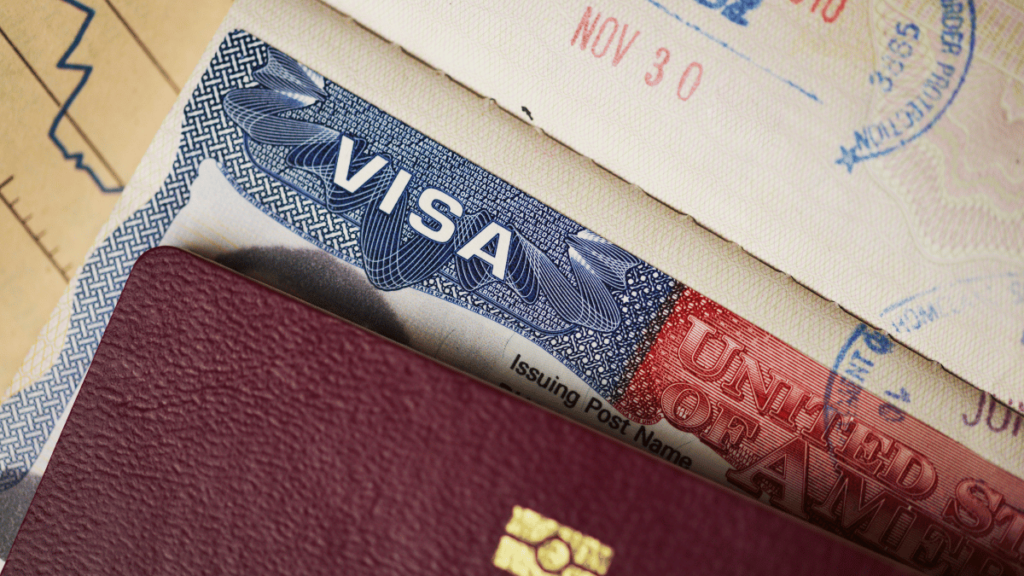
What is the EB-2 Visa?
The EB-2 visa is an employment-based immigrant visa for professionals with exceptional abilities or advanced degrees. It requires sponsorship from a U.S. employer and a labor certification process (PERM) to demonstrate that no qualified U.S. workers are available for the job.
Key Criteria for EB-2 Visa:
- Advanced Degree: Master’s degree or higher (or a bachelor’s degree plus five years of progressive experience).
- Exceptional Ability: Significant expertise in sciences, arts, or business with documented evidence.
- Labor Certification: Employer must complete the PERM process to prove no suitable U.S. workers are available.
What is the EB-2 NIW (National Interest Waiver) Visa?
The EB-2 NIW visa is a special category under the EB-2 classification that allows applicants to bypass the labor certification process if their work is deemed to be in the “national interest” of the United States. This visa type does not require employer sponsorship.
Key Criteria for EB-2 NIW Visa:
- National Interest: The applicant’s work must have substantial merit and national importance.
- Waiver Justification: The applicant must demonstrate that waiving the labor certification would benefit the U.S.
- Self-Petition: Applicants can apply without employer sponsorship.
Key Differences Between EB-2 and EB-2 NIW Visas
| Feature | EB-2 Visa | EB-2 NIW Visa |
|---|---|---|
| Labor Certification | Required (PERM process) | Not required (waived due to national interest) |
| Employer Sponsorship | Mandatory | Not required (self-petition allowed) |
| Eligibility | Advanced degree or exceptional ability | Work of substantial merit and national importance |
| Processing Time | Longer due to PERM review | Generally faster without labor certification |
| Flexibility | Tied to employer | Greater freedom to change jobs |
Labor Certification Process (PERM): The EB-2 visa requires a labor certification (PERM) where the U.S. employer proves there are no qualified U.S. workers for the position. The EB-2 NIW visa does not require this, which can significantly speed up the process.
Eligibility Criteria: While both visas require advanced qualifications, the EB-2 NIW requires the applicant to show that their work is in the national interest, a criterion that does not apply to the standard EB-2 visa.
Processing Time Comparison: The EB-2 visa process can be longer due to the labor certification requirement, whereas EB-2 NIW may be processed faster since this step is waived.

Who Qualifies for an EB-2 Visa?
You may qualify for an EB-2 visa if you meet one of the following criteria:
- You hold an advanced degree (master’s or higher) or a bachelor’s degree with five years of progressive experience.
- You possess exceptional ability in the sciences, arts, or business, demonstrated through consistent recognition and expertise.
Who Is Eligible for the EB-2 NIW Visa?
To qualify for an EB-2 NIW visa, you must:
- Demonstrate that your work is of substantial merit and national importance.
- Show that you are well-positioned to advance your work.
- Prove that waiving the labor certification requirement is beneficial to the U.S.
Advantages and Disadvantages of EB-2 and EB-2 NIW Visas
When considering whether to apply for an EB-2 or an EB-2 NIW visa, it is crucial to weigh the advantages and disadvantages of each option. Both visas provide a path to U.S. permanent residency but have distinct requirements and benefits. Understanding these pros and cons will help you decide which route aligns better with your professional goals and immigration circumstances.
| Feature | EB-2 Visa | EB-2 NIW Visa |
| Advantages | – Clear criteria with employer support. – Suitable for professionals with a strong employer sponsor. | – No employer sponsorship required (self-petition possible). – Faster process due to waived labor certification.- Greater career flexibility. |
| Disadvantages | – Requires labor certification (lengthy and complex). – Limits job flexibility due to employer sponsorship. | – Higher burden of proof (national interest requirement). – Requires substantial evidence to justify the waiver. |
Which Visa Is Right for You: EB-2 or EB-2 NIW
Deciding between the EB-2 vs. EB-2 NIW visas depends on your specific qualifications, career goals, and whether you have an employer willing to sponsor you. Both visas offer a path to U.S. permanent residency, but they differ in terms of requirements and benefits. Below are the factors to consider when choosing the right option for you.
Choose EB-2 Visa If:
- You have a U.S. employer willing to sponsor you.
- You meet the advanced degree or exceptional ability criteria.
Choose EB-2 NIW Visa If:
- Your work has substantial merit and national importance.
- You prefer to self-petition without employer sponsorship.
- You seek greater job flexibility.
Final Thoughts: Choosing Between EB-2 and EB-2 NIW
Both the EB-2 visa and the EB-2 NIW visa offer pathways to U.S. permanent residency for qualified professionals. The right choice depends on your qualifications, employer sponsorship availability, and whether your work serves the national interest. Understanding the differences and meeting the eligibility requirements is crucial for a successful application. If you’re unsure which visa fits your situation, consulting with an immigration attorney can provide personalized guidance and improve your chances of success.
If you’re considering the EB-2 vs. EB-2 NIW visa as a pathway to U.S. permanent residency and eventually citizenship, understanding the key distinctions between these visa categories is crucial. This article outlines the eligibility, application process, and pros and cons of both options to help you make an informed decision. With careful planning and a well-prepared application, you can increase your chances of success. For additional support, you can reach out to CK Law Firm official website, or connect with me on LinkedIn for more personalized guidance.

Asım Kılınç, Immigration Attorney, CK Law Firm
The H1B visa is a significant opportunity for foreign professionals seeking to work in the United States. However, to apply for this visa, you must meet specific requirements and prepare all necessary H-1B visa documents thoroughly. In this article, I will cover the following topics related to the H-1B visa requirements and the application process:
- Understanding the H-1B Visa Requirements
- Required Documents for the H-1B Visa
- How Does the H-1B Visa Application Process Work?
- Frequently Asked Questions About the H-1B Visa
If you have additional questions about the H-1B visa, feel free to reach out through the comments section of this blog or via the website of CK Law Firm, our immigration law firm. For personalized inquiries and consultancy services, you can also connect with me directly on LinkedIn.
Understanding the H-1B Visa Requirements
To fully understand the H1B visa requirements, it is essential to first know about USCIS (U.S. Citizenship and Immigration Services). As the main agency managing the H1B visa, USCIS evaluates applications based on specific criteria. Meeting these criteria ensures compliance with H-1B visa conditions. So, who qualifies for an H1B visa? According to USCIS, the following are key requirements:
- Job Offer: Applicants must have a formal job offer from a U.S.-based company.
- Specialized Expertise: The job must require specialized skills, and the applicant should have expertise in that field. Examples include software development, engineering, finance, or healthcare.
- Educational Background: Since the H1B visa is not open to everyone, applicants must hold at least a bachelor’s degree or its equivalent.
- Sponsoring Employer: The U.S. company not only provides the job offer but also takes responsibility for submitting the majority of the visa application on behalf of the applicant.
Necessary Documents for the H-1B Visa
The documentation needed for the H1B visa application process can be categorized into two main groups: documents required from the applicant and those required from the employer. Here, I will outline the documents you need to prepare as the applicant:
- Passport: A valid passport along with copies of any previous passports.
- Identification Document: Your national ID card.
- Photograph: A biometric photo that meets U.S. visa application standards.
Additionally, keep the following points in mind:
- Foreign applicants must ensure that their passport is valid for at least the duration of the visa.
- Any documents prepared in a language other than English must be submitted with notarized English translations.
Preparing these documents accurately is essential to ensure a smooth application process.
Educational and Professional Documents for the H-1B Visa
The H1B visa is designed for professionals, so you must provide evidence of your qualifications through proper documentation. Before applying, ensure you prepare the following documents required for the H1B visa:
- Diploma: A bachelor’s or master’s degree along with your transcripts.
- Work Experience Letters: Reference letters and proof of prior work experience from previous employers.
- Certificates: Training or specialization certificates relevant to your field.
For foreign applicants, it may be necessary to submit diplomas from universities recognized in their home country as equivalent to U.S. standards. Additionally, all academic documents must be accompanied by notarized English translations to meet application requirements.
Documents Provided by the Employer
During the H1B visa application process, your employer is responsible for submitting specific documents to support your application. The required documents from the employer include:
- Job Offer Letter: An official job offer letter from the company you will be working for.
- LCA (Labor Condition Application): A document that certifies the working conditions meet U.S. standards and that the job does not pose a threat to U.S. citizens’ employment opportunities.
- Form I-129: The official immigration form required for the H-1B visa application.
Ensuring that your employer provides complete and accurate documentation is crucial for a smooth application process. Clear communication with your employer is essential to avoid any delays or issues. For further details, you can also check our article titled “H-1B Visa Application Dates (2025 Guide).”
How Does the H-1B Visa Application Process Work?
Applicants must carefully follow the H1B visa requirements to ensure the process proceeds smoothly and efficiently. Understanding each step is crucial for a successful application. Here are the key steps in the H1B visa application process:
- Employer Sponsorship Application: Your employer submits Form I-129 to USCIS to sponsor your visa.
- Labor Condition Application (LCA): The employer must get the LCA certified by the U.S. Department of Labor to confirm compliance with working conditions.
- Payment of Application Fees: The required fees must be paid by the employer.
- Consulate Interview: The applicant attends a visa interview at the U.S. consulate.
It is vital for foreign applicants to ensure all documents are complete before their U.S. consulate interview. Additionally, being able to communicate clearly in English during the interview is crucial. Practicing English and preparing your documents ahead of time will help streamline the process.
Frequently Asked Questions About the H-1B Visa
Many applicants may have questions or uncertainties during the H1B visa application process. Below, I address some of the most frequently asked questions about the H1B visa:
- How Long Does It Take to Process an H1B Visa Application?
The processing time depends on the type of application and the volume of submissions. Typically, it takes 3-6 months under standard processing. However, those who need quicker results can opt for premium processing, which ensures a decision within 15 days.
- Who Pays the H1B Visa Application Fees?
Most of the application fees are covered by the employer. However, some costs, such as fees for the consulate interview, are the responsibility of the applicant.
- What Should You Prepare for the H1B Visa Interview?
It is crucial to ensure all your documents are complete before attending the consulate interview. Double-check your paperwork beforehand. Since the interview will be conducted in English, practicing your responses in English ahead of time can be very beneficial.
- What Are the Educational Requirements for an H1B Visa?
Applicants must hold at least a bachelor’s degree. The education level should align with the requirements of the position being applied for.
- Can H1B Visa Holders Apply for a Green Card?
Yes, H1B visa holders are eligible to transition to the Green Card process. This process can be initiated through employer sponsorship, allowing you to obtain permanent residency in the United States.
In this article, I covered the H-1B visa requirements and the necessary documents for the application. If you have additional questions, feel free to reach out through the comments section of this blog or via our website. For personalized inquiries or to benefit from my consultancy services, you can also connect with me on LinkedIn.
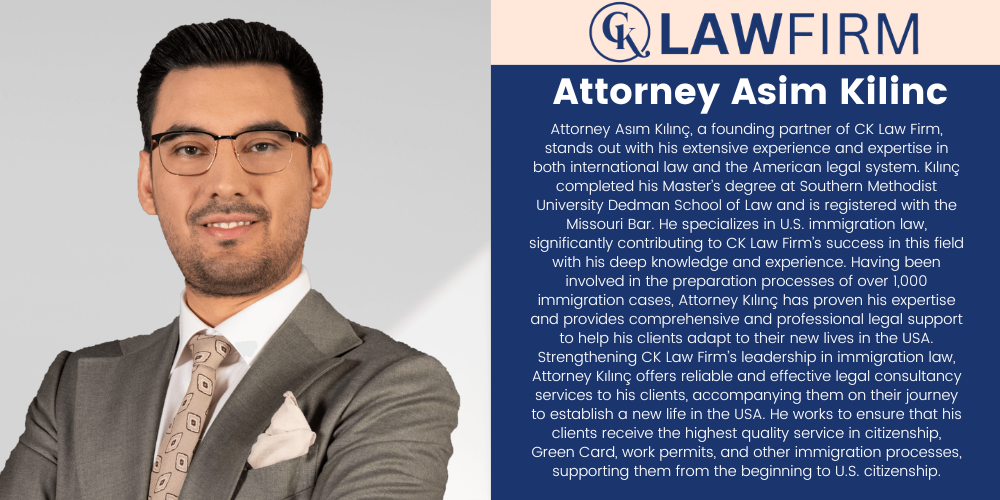
Subscribe to Our Newsletter
Subscribe to our newsletter to stay informed about the latest announcements and articles written by our attorneys on U.S. immigration processes.
Aout Us
Our experienced lawyers at CK Law Firm offer effective solutions for those who want to make new beginnings in the USA. We facilitate and accelerate your immigration process by providing consultancy on all visa types.
Our Services
Visas
Business Green Card
Family Green Card
US Citizenship
Talent and Performance Visas
Work Visas
Investor and Trader Visas
Contact Us
+1 (972) 363- 96 89
info@cklawfirm.org
Address
2800 Regal Rd #102, Plano, TX 75075

All Rights Reserved by CK Law Firm.


